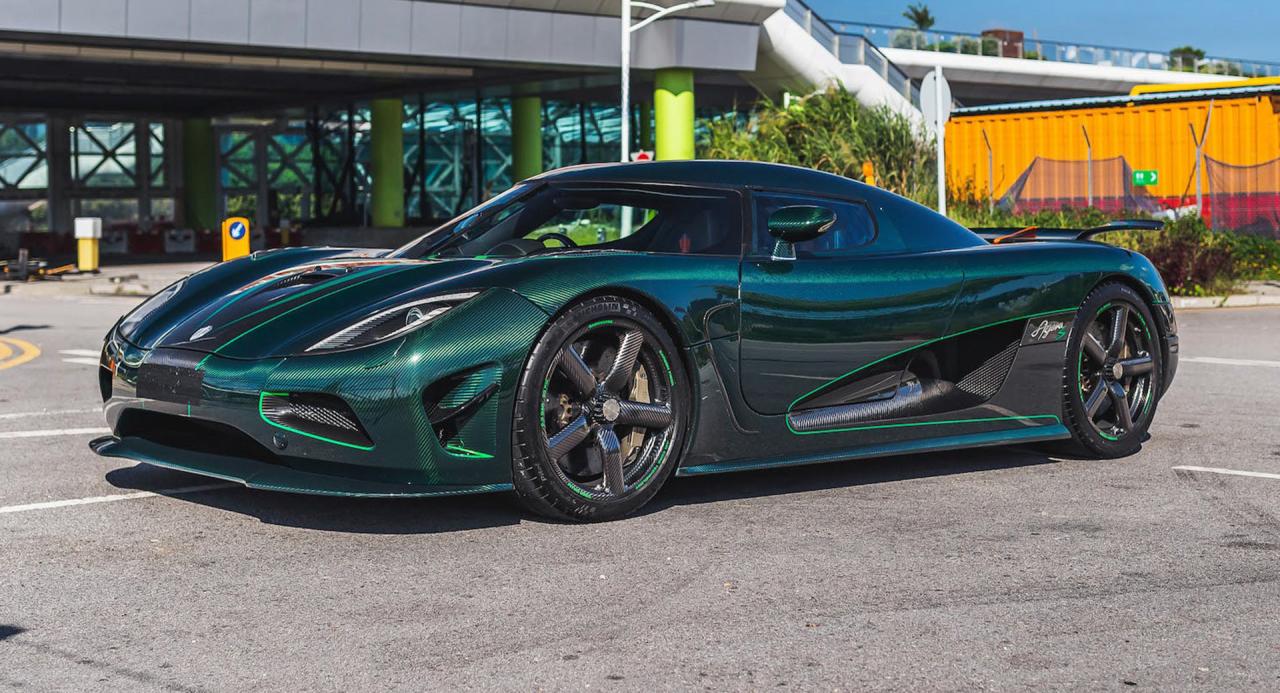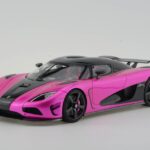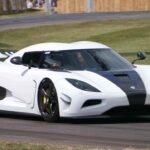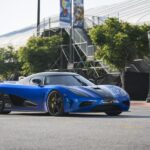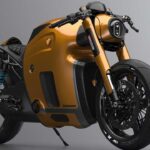Full carbon Koenigsegg represents a groundbreaking achievement in the automotive industry, showcasing the unparalleled craftsmanship and innovative spirit that defines the Swedish supercar manufacturer. With its exceptional performance, cutting-edge design, and unwavering commitment to excellence, the full carbon Koenigsegg has captivated the hearts of enthusiasts worldwide.
The relentless pursuit of speed and aerodynamic efficiency has led Koenigsegg to embrace the transformative properties of carbon fiber. This remarkable material, renowned for its strength, lightness, and rigidity, has become an integral part of Koenigsegg’s DNA, enabling the creation of vehicles that redefine the boundaries of automotive engineering.
Full Carbon Koenigsegg
Koenigsegg is renowned for its groundbreaking use of carbon fiber in the automotive industry. Full carbon fiber construction plays a pivotal role in the performance and aesthetics of Koenigsegg vehicles.
Koenigsegg’s full carbon fiber bodies are crafted from a lightweight and incredibly strong material. This advanced composite offers exceptional rigidity and torsional stiffness, resulting in vehicles that are both agile and robust.
Advantages of Full Carbon Fiber Construction
- Lightweight: Carbon fiber is exceptionally lightweight, allowing Koenigsegg vehicles to achieve impressive power-to-weight ratios for enhanced acceleration and handling.
- Strength and Durability: Despite its lightweight nature, carbon fiber is incredibly strong and durable, providing superior protection for occupants in the event of a collision.
- Aerodynamics: The smooth and seamless surface of full carbon fiber bodies reduces drag and improves aerodynamic efficiency, contributing to higher top speeds and fuel efficiency.
Disadvantages of Full Carbon Fiber Construction, Full carbon koenigsegg
- Cost: Carbon fiber is an expensive material, making full carbon fiber construction a costly option compared to traditional materials.
- Repair Complexity: Repairing carbon fiber damage can be complex and time-consuming, requiring specialized expertise and equipment.
- Heat Sensitivity: Carbon fiber can be susceptible to heat damage, particularly at high temperatures, which can limit its use in certain applications.
Examples of Koenigsegg Models with Full Carbon Fiber Bodies
- Koenigsegg One:1
- Koenigsegg Regera
- Koenigsegg Jesko
- Koenigsegg Gemera
Koenigsegg Supercars
Supercars are high-performance sports cars characterized by exceptional speed, acceleration, and handling. Koenigsegg fits firmly within this category, producing vehicles that push the boundaries of automotive engineering.
Koenigsegg supercars are renowned for their lightweight carbon fiber construction, advanced aerodynamics, and powerful engines. They feature cutting-edge technologies such as active rear wings, torque vectoring systems, and sophisticated traction control algorithms.
Unique Characteristics and Capabilities
Koenigsegg supercars are designed to deliver unparalleled performance on both road and track. They boast:
- Lightweight carbon fiber monocoques, resulting in exceptional strength and rigidity while minimizing weight.
- Aerodynamically optimized designs, generating downforce and reducing drag for increased stability and speed.
- Powerful and efficient engines, typically twin-turbocharged V8s, delivering explosive acceleration and top speeds exceeding 270 mph.
- Advanced suspension systems, ensuring precise handling and grip even at extreme speeds.
Iconic Models
Koenigsegg has produced a series of iconic supercar models, including:
- CCX: A milestone model known for its groundbreaking design and performance, with a top speed of 245 mph.
- Agera R: The world’s fastest production car in 2011, with a top speed of 273 mph.
- Regera: A hybrid supercar featuring a 1,500-horsepower powertrain, capable of 0-60 mph in under 2.8 seconds.
- Jesko Absolut: The current holder of the world’s fastest production car record, with a top speed of 330 mph.
Koenigsegg Design Philosophy: Full Carbon Koenigsegg
Koenigsegg’s design philosophy revolves around creating vehicles that embody the pinnacle of automotive engineering, blending aerodynamics, performance, and aesthetics seamlessly. With a focus on pushing the boundaries of automotive innovation, Koenigsegg’s designs prioritize speed, agility, and a visceral driving experience.
Aerodynamics plays a pivotal role in Koenigsegg’s design ethos. The company’s vehicles are meticulously crafted with advanced aerodynamic features, such as active spoilers and diffusers, to optimize airflow and minimize drag. This attention to aerodynamics not only enhances performance but also contributes to the distinctive and striking appearance of Koenigsegg supercars.
Integration of Performance and Aesthetics
Koenigsegg’s design philosophy emphasizes the harmonious integration of performance and aesthetics. The company’s vehicles are engineered to deliver exceptional performance without compromising on visual appeal. Lightweight materials, such as carbon fiber and titanium, are extensively used to reduce weight and enhance agility, while sleek and aerodynamic bodywork ensures minimal resistance.
The result is a range of supercars that not only excel on the track but also turn heads with their stunning designs. Koenigsegg’s vehicles are a testament to the company’s ability to blend form and function seamlessly.
Design Innovations
Koenigsegg has a long history of pioneering design innovations that have redefined the automotive landscape. Some notable examples include:
- The Koenigsegg AirCore™ System: An innovative chassis design that utilizes air to reduce drag and enhance downforce.
- The Koenigsegg Triplex Suspension: A revolutionary suspension system that provides exceptional handling and stability.
- The Koenigsegg Ghost Light: A unique lighting system that combines LED and laser technology to provide superior visibility and style.
These innovations demonstrate Koenigsegg’s commitment to pushing the boundaries of automotive design and engineering.
Koenigsegg Engineering
Koenigsegg is renowned for its advanced engineering techniques and technologies that push the boundaries of automotive performance. The company’s vehicles are meticulously crafted with a relentless pursuit of innovation and极致. Koenigsegg engineers leverage lightweight materials, high-performance engines, and innovative suspensions to create extreme performance machines that redefine the limits of what is possible.
Lightweight Materials
Koenigsegg’s commitment to lightweight construction is evident in its extensive use of carbon fiber. This advanced material offers exceptional strength-to-weight ratio, allowing Koenigsegg to create vehicles that are both robust and incredibly light. The company’s in-house production of carbon fiber components ensures the highest quality and precision, resulting in a significant reduction in overall vehicle weight.
High-Performance Engines
At the heart of every Koenigsegg lies a high-performance engine that delivers blistering acceleration and breathtaking speed. The company’s engineers have mastered the art of engine design, utilizing cutting-edge technologies such as twin-turbocharging and advanced fuel injection systems. Koenigsegg engines are renowned for their exceptional power output, responsiveness, and durability.
Innovative Suspensions
Koenigsegg’s innovative suspensions play a pivotal role in delivering exceptional handling and stability, even at extreme speeds. The company’s patented Triplex Suspension System features three independent dampers per wheel, allowing for precise control over each tire’s contact patch. This advanced suspension system ensures optimal grip, responsiveness, and comfort, regardless of road conditions.
Engineering Challenges and Solutions
Creating extreme performance vehicles presents numerous engineering challenges. Koenigsegg engineers overcome these challenges through meticulous attention to detail and innovative solutions. For example, the company’s use of lightweight materials and high-performance engines necessitates advanced cooling systems to manage heat dissipation. Koenigsegg engineers have developed unique cooling solutions, such as the Aircore Carbon Fiber System, which integrates cooling channels directly into the vehicle’s carbon fiber structure.
Koenigsegg Performance
Koenigsegg supercars are renowned for their exceptional performance capabilities. With advanced engineering and meticulous attention to detail, Koenigsegg vehicles deliver breathtaking acceleration, lightning-fast top speeds, and razor-sharp handling.
Acceleration
Koenigsegg models consistently rank among the fastest accelerating cars in the world. The Koenigsegg Jesko Absolut, for instance, boasts a staggering 0-60 mph time of just 2.5 seconds and a 0-249 mph time of an astonishing 12.5 seconds. The Koenigsegg Agera RS, another legendary model, can sprint from 0-186 mph in a mere 11.36 seconds.
Top Speed
Koenigsegg supercars are also known for their extraordinary top speeds. The Koenigsegg Jesko Absolut holds the current production car world record for the highest verified top speed, reaching an astounding 330 mph (531 km/h) during a record-breaking run in 2022.
Handling
Beyond their blistering speed, Koenigsegg supercars are engineered for exceptional handling. Advanced aerodynamic features, including active rear wings and front splitters, generate significant downforce, enhancing stability and cornering capabilities. Koenigsegg’s unique Triplex suspension system provides exceptional road holding and agility, allowing drivers to push the limits with confidence.
In comparison to other high-end supercars, Koenigsegg vehicles consistently perform at the pinnacle. The Koenigsegg Jesko Absolut, for example, has surpassed the acceleration and top speed records previously held by the Bugatti Chiron Super Sport 300+. The Koenigsegg Agera RS has also outperformed rivals such as the McLaren P1 and Ferrari LaFerrari in terms of handling and overall performance.
Koenigsegg Customization
Koenigsegg offers an unparalleled level of customization for its discerning clientele. Each supercar is meticulously tailored to the individual preferences of its owner, resulting in truly bespoke creations that reflect their unique style and personality.
The full carbon Koenigsegg, with its lightweight construction and impressive performance, has become a sought-after vehicle for car enthusiasts. Stradman’s Koenigsegg , in particular, has gained attention for its unique customization and eye-catching appearance. However, beyond the aesthetic appeal, the full carbon Koenigsegg remains a testament to the brand’s commitment to pushing the boundaries of automotive engineering.
The customization process begins with a consultation between the customer and the Koenigsegg design team. Together, they explore a vast array of options, from exterior colors and materials to interior appointments and performance upgrades. Koenigsegg’s in-house atelier is staffed by skilled artisans who are dedicated to crafting each detail with precision and passion.
Exterior Customization
- Color: Koenigsegg offers a wide range of exterior colors, including vibrant hues, metallic finishes, and custom-developed shades.
- Materials: Customers can choose from a variety of materials for the exterior, including carbon fiber, aluminum, and titanium.
- Aerodynamics: Koenigsegg’s engineers can modify the aerodynamics of the supercar to enhance performance or create a more aggressive appearance.
Interior Customization
- Upholstery: Koenigsegg offers a wide range of upholstery options, from luxurious leathers to exotic fabrics.
- Trim: Customers can choose from a variety of trim materials, including carbon fiber, wood, and metal.
- Technology: Koenigsegg’s supercars can be equipped with the latest technology, including advanced infotainment systems and driver assistance features.
Performance Customization
- Engine: Koenigsegg offers a range of engine upgrades, including increased horsepower, torque, and responsiveness.
- Transmission: Customers can choose from a variety of transmissions, including manual, automatic, and sequential.
- Suspension: Koenigsegg’s engineers can customize the suspension to suit the customer’s driving style and road conditions.
The result of Koenigsegg’s extensive customization options is a truly unique supercar that is a reflection of its owner’s discerning taste and passion for driving excellence.
Koenigsegg Heritage and Legacy
Koenigsegg Automotive AB, founded in 1994 by Christian von Koenigsegg, has emerged as a prominent player in the automotive industry, renowned for its exceptional supercars.
Christian von Koenigsegg’s passion for automobiles ignited at an early age, fueling his ambition to create a supercar that would redefine performance and design. With a team of skilled engineers and designers, Koenigsegg embarked on a journey to push the boundaries of automotive engineering.
Founder’s Vision and Passion
Christian von Koenigsegg’s vision for Koenigsegg was to create supercars that embodied a harmonious blend of raw power, innovative technology, and unparalleled craftsmanship. He believed that every Koenigsegg should be a masterpiece, meticulously engineered to deliver an exhilarating driving experience.
Koenigsegg’s commitment to excellence extends beyond performance. The company places great emphasis on aesthetics, ensuring that each supercar is a visual spectacle. The sleek lines, aerodynamic curves, and intricate details reflect the artistry and passion that go into every Koenigsegg creation.
Impact on the Automotive Industry
Koenigsegg’s impact on the automotive industry has been profound. The company’s relentless pursuit of innovation has pushed the boundaries of what is possible in automotive design and engineering. Koenigsegg’s supercars have set numerous world records, showcasing the company’s technological prowess.
Beyond its record-breaking achievements, Koenigsegg has earned widespread recognition for its unique approach to supercar design. The company’s cars are not merely machines; they are works of art that evoke passion and admiration among enthusiasts worldwide.
Reputation Among Enthusiasts
Among automotive enthusiasts, Koenigsegg enjoys a legendary reputation. The company’s supercars are highly sought after by collectors and drivers who appreciate the极致performance, cutting-edge technology, and exquisite craftsmanship that define the Koenigsegg brand.
Full carbon Koenigseggs are a sight to behold, with their sleek lines and aggressive stance. The Koenigsegg Odin is no exception, with its full carbon fiber body and powerful twin-turbocharged V8 engine. The Odin is a true masterpiece of engineering, and its full carbon construction makes it both lightweight and incredibly strong.
The result is a car that is both exhilarating to drive and a work of art to behold.
Koenigsegg’s reputation is not limited to its supercars; the company has also gained recognition for its commitment to customer service and exclusivity. Koenigsegg owners are part of an exclusive club, enjoying access to a dedicated team of experts and exclusive events.
Ending Remarks
As the automotive landscape continues to evolve, Koenigsegg stands poised at the forefront of innovation, pushing the limits of what is possible. With its unwavering dedication to carbon fiber technology and relentless pursuit of perfection, Koenigsegg is destined to leave an enduring legacy in the annals of automotive history.
Expert Answers
What is the significance of full carbon fiber construction in Koenigsegg vehicles?
Full carbon fiber construction provides exceptional strength, lightness, and rigidity, allowing Koenigsegg to create vehicles with unparalleled performance and handling capabilities.
What are the advantages of full carbon fiber construction?
Advantages include increased strength, reduced weight, improved aerodynamics, and enhanced durability.
What are the disadvantages of full carbon fiber construction?
Disadvantages include higher production costs and the need for specialized manufacturing techniques.
How does Koenigsegg incorporate aerodynamics into its designs?
Koenigsegg utilizes advanced computational fluid dynamics and wind tunnel testing to optimize the aerodynamics of its vehicles, reducing drag and enhancing stability at high speeds.
What are some examples of iconic Koenigsegg supercar models?
Iconic models include the Agera RS, Regera, and Jesko, renowned for their breathtaking performance and innovative features.




